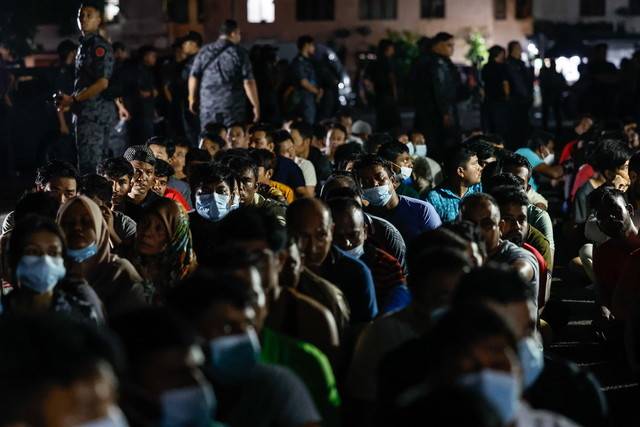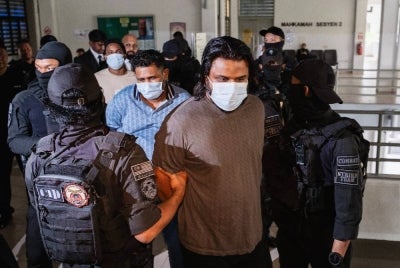Set up integrated enforcement system to address undocumented immigrant issue - Experts
The existing system of authorities working "in silos" has proven to be not effective enough.

KUALA LUMPUR - Despite the numerous raids conducted by enforcement forces against undocumented immigrants, their numbers don’t seem to be diminishing in the eyes of the general public.
In fact, some of these undocumented foreigners can be seen boldly defying the nation’s laws and their audacious exploits have been documented in videos shared by netizens and activists on social media, leading to a perception among some that the authorities’ enforcement operations are ineffective.
Experts Bernama spoke to contend that an integrated central enforcement system must be established to step up the enforcement process and ensure its efficiency.
In short, the existing system of authorities working "in silos" has proven to be not effective enough.
INTEGRATED SYSTEM
According to deputy head of the Population and Migration Research Centre at Universiti Malaya (UM) Associate Prof Dr Mashitah Hamidi, executing enforcement operations independently stands out as one of the main flaws in the current system.
"This situation has led the public to perceive those operations as ineffective.
"Each enforcement agency has its own portfolio and the operations carried out by them are solely aimed at fulfilling their targets,” she told Bernama, adding that it is only recently raids against illegal immigrants - particularly in areas with a high concentration of foreigners - have become more evident.
"Such raids were conducted previously but only in certain places such as bars or nightclubs, or at business premises or factories operating illegally," she said.
To enhance the efficiency of enforcement operations, Mashitah suggested that the government establish an integrated central enforcement system that will bring all enforcement agencies under one umbrella.
"With integrated collaboration among enforcement agencies, conflicts in the aspects of detention and bureaucracy can be reduced, which will expedite the migrant processing system particularly the aspect concerning deportation," she said.
She believed such collaboration among the authorities can result in stakeholders such as employers showing more willingness to comply with the relevant laws.
CHALLENGING
Agreeing it is essential for Malaysia to have an integrated enforcement system to tackle the illegal immigrant issue, Malaysia International Humanitarian Organisation secretary-general Datuk Hishamuddin Hashim said when each enforcement authority operates independently, their actions are limited to their individual capacities.
"Indeed, the illegal immigrant issue is one of the biggest challenges faced by the authorities concerned. And, considering the vast expanse of our national borders, it’s practically impossible to monitor all the ‘rat routes’ (used by foreigners to get into the country illegally)," he said.
He added it is also difficult to monitor the huge number of foreigners who enter Malaysia legally but remain in the country even after their visitor’s pass (temporary employment) or short-term social visit pass has expired.
He also said it is not fair for the public to blame the Immigration Department of Malaysia for the presence of undocumented migrant workers, considering the limitations in the agency’s capacity.
"It may have hundreds or a few thousand officers throughout the country but they have to monitor ‘millions’ of foreigners,” he said.
According to Hishamuddin, the matter is exacerbated by the issue of overcrowding at the various Immigration depots.
"Each time there’s an operation, the depots become even more congested as most of them are already packed with detainees awaiting (completion of) legal proceedings and deportation," he said.
A recent case where 132 Myanmar and Rohingya illegal immigrants escaped from a temporary Immigration detention centre in Bidor, Perak, highlights the challenges faced by the authorities.
It was reported the detainees escaped after a riot broke out at the centre and fled towards the North-South Expressway. It was also reported that one of the escapees died after being involved in an accident on the highway concerned.
Hishamuddin said the overcrowded conditions at depots pose risks of riots and fights as well as disease transmission.
Overcrowding at detention centres can be attributed to several factors, one of which is the inability of the detainees to pay the fine imposed on them by the court for not possessing valid documents.
"Foreigners without a visa and work permit can be remanded for 14 days and charged in court under Section 6 (1c) of the Immigration Act 1959/63 which provides for a jail term not exceeding five years or a fine of up to RM10,000 or both if found guilty... the offenders are also liable to whipping of not more than six strokes," Hishamuddin explained.
Bernama understands that in most cases involving undocumented migrants, the court opts for imposing fines to prevent overcrowding in prisons. However, not all of them can afford to pay the fines, resulting in them languishing at the depots.
"But the longer they are held at the depots, the higher the costs borne by the government," he said, adding the cost of providing food and beverages to the detainees comes to about RM30 per person per day.
Supporting the Migrant Repatriation Programme announced by Home Minister Datuk Seri Saifuddin Nasution Ismail in January that will take effect on March 1, Hishamuddin said the government should consider increasing the number of places where the foreign nationals involved can get their exit pass.
"Instead of doing it only at the headquarters of the Immigration Department in every state, this programme should also be made available at all entry/exit points including every airport as well as the Malaysian-Thai border at the Bukit Kayu Hitam highway... this will facilitate their exit from this country," he added.
Under the Migrant Repatriation Programme, undocumented foreigners will be deported without being prosecuted after they have settled compounds ranging from RM300 to RM500 for various immigration offences including overstaying and entering the country without valid travel documents.
The government previously implemented the Workforce Recalibration Programme which concluded on Dec 31, allowing employers to hire undocumented foreigners who were issued work permits after they had settled their compounds.
MORE SEVERE PENALTIES
Hishamuddin also suggested that the penalties be made more stringent for foreign nationals who flout the conditions of their visitor’s pass (temporary employment) or social visit pass by engaging in business activities that disrupt the local business ecosystem.
"Currently, they (if detained by the authorities) face a fine of not more than RM1,000 or jail term not exceeding six months or both. I think the penalties are too lenient and need to be reviewed and made more stringent to instil fear in (potential) offenders," he said, adding it is high time this issue of foreigners engaging in business activities illegally was properly addressed.
"Our traders are suffering huge losses as they (undocumented migrants) have boldly ventured into the retail, textile, laundry and other businesses. In fact, some of them have become bosses and have their own companies. This is extremely unfair to our local entrepreneurs," he pointed out.
According to media reports, the involvement of foreign nationals in this country’s employment and business sectors amounts to one foreigner for every 10 Malaysian citizens.
UM’s Mashitah, meanwhile, urged the government to step up the monitoring of foreigners entering the country similar to what is done in some advanced countries like Australia.
"While we already have a sophisticated digitalised system to record the entry and exit of foreigners, what sets us apart from Australia is the monitoring aspect.
"(In Australia) if we don’t provide a complete address, we face the risk of being sent back (to our home country). So, over there, whether they are tourists, students or those seeking casual employment (seasonal work), they can’t get into the country without (providing) accurate information," she said, adding the measures implemented by Australia have apparently succeeded in reducing the number of foreigners overstaying there.
Mashitah also suggested that the government create a system similar to the national Central Database Hub or Padu to manage the presence of foreigners in Malaysia.
"With a digitalised system like this (Padu), we can track the movements of foreign nationals, right from the time they enter the country until they leave upon the expiration of their permit or visa," she said.
Head of Social, Law and Human Rights at EMIR Research Jason Loh said for the time being, the government is not able to completely curb the entry of foreign workers due to the shortage of labour in certain industries.
"It’s not all that realistic to expect all our industries and economic sectors to completely stop depending on foreign workers. So, what the government must do is focus on efforts to empower human capital comprising local citizens,” he said.
Urging the government to review the nation’s vocational and technical education programme to ensure it meets industry needs and demands, Loh said the Academy in Industry (AiL) initiative announced by Economy Minister Rafizi Ramli is appropriate in moving forward and breathing new life into collaborations and strategic partnerships between educational institutions and the industry.
"It is hoped that AiL will evolve into Industry in Academy, where industry experts and practitioners are given space within public and private higher education institutions to ensure the symbiotic relationship between both parties continues to be sustained and strengthened," he said, adding this approach will hopefully increase the talent pool as well as the number of skilled and semi-skilled workers from the local population. - BERNAMA
Download Sinar Daily application.Click Here!














